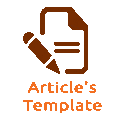HINDU EDUCATION IN INDONESIA: CRITIQUE AND REFLECTIVITY
DOI:
https://doi.org/10.25078/vidyottama.v8i1.2974Keywords:
Education Indonesia, Criticism, ReflectivityAbstract
Education is the human medium to know and understand knowledge acquired multidimensionally, both empirical and metaphysical dimensions. Education has the usefulness of forming a man who is speaking, intelligent, and with a character of dignity. As times change, education is faced with cases such as degradation of values that affect the low quality of education. In generating valid and reliable data, this writing is made qualitatively. In producing logical data, it performs some forms of data processing such as data reduction, data display, data verification, and data interpretation. In its presentation, the writing of data on this paper is analyzed measurably and systematically. The data in this paper is taken from various phenomena about the dynamics of education in Indonesia where the specifications are education based on desire that is obtained from various literature books as well as various Internet sources.The existence of Hindu-based education in Indonesia has fundamental differences from other countries in terms of purpose. Each country has its own idealism in pursuing its education to have a clear output. Unlike education in Indonesia specifically related to desire, it is still grey because national education goals are still inclusive and less focused. This situation creates chaos in the Indonesian education system that tends to be still lower than the neighbouring countries. The curriculum is constantly changing with the change of leadership, the student's attributes tend to disappear due to the selfishness and cults of parents, the forced work of teachers and the extra work outside of class, and the low appreciation of the administrators. In order to create a good educational climate, the role of the educational force, the teachers of the discourse, as well as my other teachers should be more optimized in building a more ideal educational paradigm in terms of both character formation, satisfaction of the pupils, efficiency of work, and proper appreciation.
References
Buchori, M. (1994). Education in Development. Jakarta: IKIP Muhammadiyah Jakarta Press.
Cong Sujana, I Wayan. ADI WIDYA: Journal of Basic Education Volume. 4, Number 1 April 2019 (30) ISSN: 977 2527544 0.
Malla, H. A. B. (2011). A Socio-historical Study of the Politics of Islamic Education Policy in Indonesia. Inspirasi, XIV (October), 13.
Mukodi. (2015). The Challenges of Teacher Professionalism Towards the Golden Indonesia 2030.
Mukodi. 2016. Reflection on the Dynamics of Education Policy in Indonesia. Journal of Educator Profession: Indonesian Education Bachelor Association (ISPI) Central Java Volume 3 Number 2, November 2016 (141-142).
Mulyasa, E. 2003. Becoming a Professional Teacher, Creating Creative and Fun Learning Law Sisdiknas Th 2003. Jogjakarta: Media Discourse.
Tilaar, H. A. R. (1995). 50 Years of National Education Development 1945-1995 A Policy Analysis. Indonesia: PT Grasindo.
Usman, Moh. Uzer. 2005. Becoming a Professional Teacher. Bandung: PT Remaja Rosdakarya.
Website:
https://www.indonesiana.id/read/150057/merdeka-belajar-sebagai-pendidikan-postmodern-dan-kisah-terapannya (accessed February 2, 2023)
https://www.republika.co.id/berita/qrqnuu483/pandangan-dan-tantangan pendidikan-indonesia (accessed March 3, 2023)
https://www.detik.com/bali/berita/d6590194/sulinggih-mesum-viral-tidak-terdaftar-di-phdi-buleleng
https://www.balipost.com/news/2019/07/03/79903/Di-Luar-Bali-Kekurangan-Ribuan...html


















